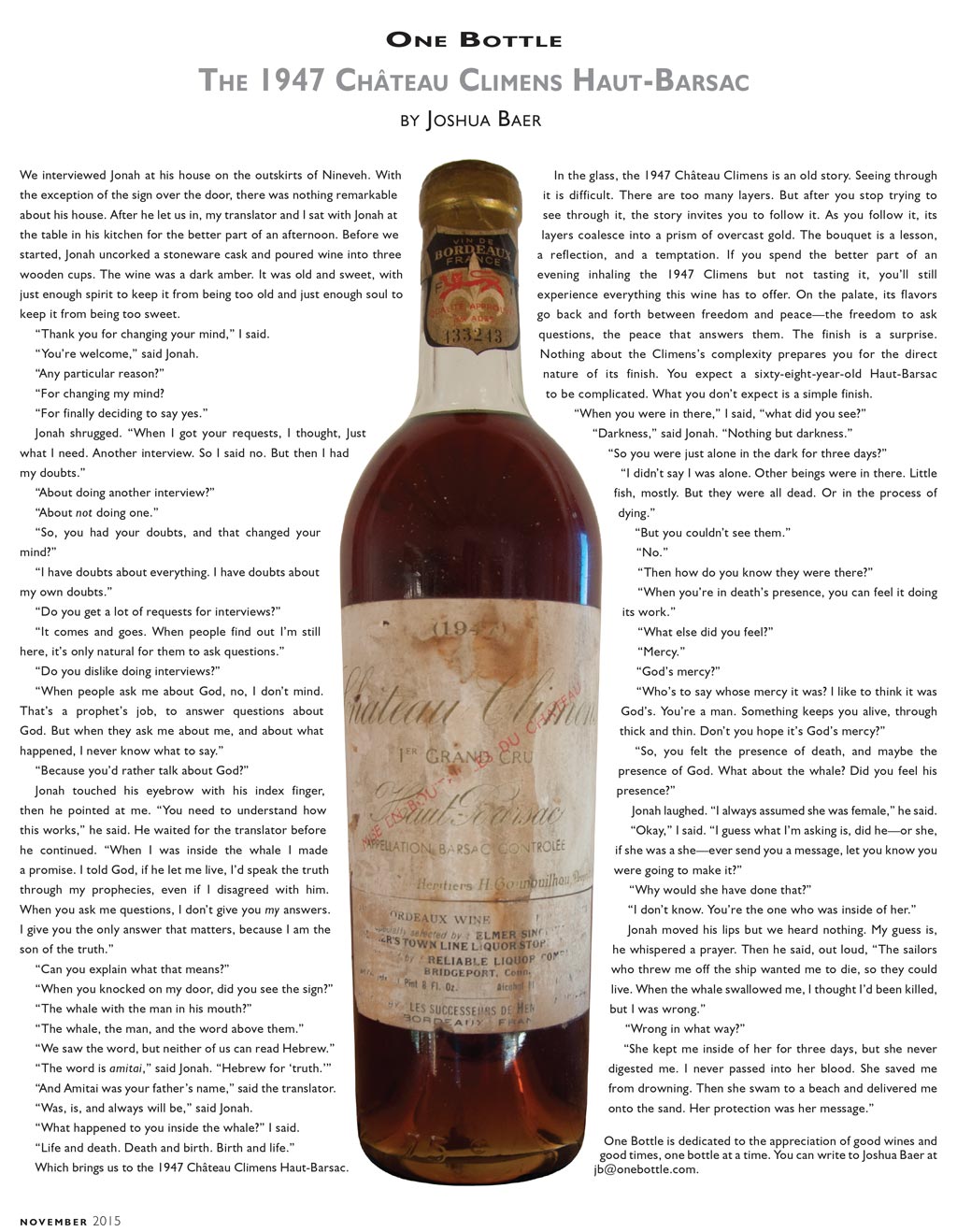1947 Château Climens Haut-Barsac
We interviewed Jonah at his house on the outskirts of Ninevah. With the exception of the sign over the door, there was nothing remarkable about his house. After he let us in, my translator and I sat with Jonah at the table in his kitchen for the better part of an afternoon. Before we started, Jonah uncorked a stoneware cask and poured wine into three cups. The wine was a dark amber. It was old and sweet, with just enough spirit to keep the wine from being too old and just enough soul to keep it from being too sweet.
“Thank you for changing your mind,” I said.
“You’re welcome,” said Jonah.
“Any particular reason?”
“For changing my mind?
“For finally deciding to say yes.”
Jonah shrugged. “When I got your requests, I thought, Just what I need. Another interview. But then I had my doubts.”
“About doing another interview?”
“No, about not doing one.”
“So, you had your doubts, and that changed your mind?”
“I have doubts about everything. I have doubts about my own doubts.”
“Do you get a lot of requests for interviews?”
“It comes and goes. When people find out I’m still here, it’s only natural for them to ask questions.”
“Do you dislike doing interviews?”
“When people ask me about God, no, I don’t mind. That’s a prophet’s job, to answer questions about God. But when they ask me about me, and about what happened, I never know what to say.”
“Because you’d rather talk about God?”
Jonah touched his eyebrow with his index finger, then he pointed at me. “You need to understand how this works,” he said. He waited for the translator before he continued. “When I was inside the whale I made a promise. I told God that if he let me live I’d speak the truth through my prophecies, even if I disagreed with him. When you ask me questions, I don’t give you my answers. I give you the only answer that matters. I am the son of the truth.”
“Can you explain what that means?”
“When you knocked on my door, did you see the sign?”
“The whale with the man in his mouth?”
“The whale, the man, and the word above them.”
“We saw the word, but neither of us can read Hebrew.”
“The word is amitai,” said Jonah. “Hebrew for ‘truth.’”
“And Amitai was your father’s name,” said the translator.
“Was, is, and always will be,” said Jonah.
“What happened to you inside the whale?” I said.
“Everything. Life and death. Death and birth. Birth and life.”
Which brings us to the 1947 Château Climens Haut-Barsac.
In the glass, the 1947 Château Climens is an old story. Seeing through it is difficult. There are too many layers. After you stop trying to see through it, the story invites you to follow it. As you follow it, its layers coalesce into a prism of overcast gold. The bouquet is a lesson, a reflection, and a temptation. If you spend the better part of an evening inhaling the 1947 Climens but not tasting it, you’ll still experience everything this wine has to offer. On the palate, its flavors go back and forth between freedom and peace—the freedom to ask questions, the peace that answers those questions. The finish is a surprise. Nothing about the Climens’s complexity prepares you for the direct nature of its finish. You expect a sixty-eight-year-old Haut-Barsac to be complicated. What you don’t expect is a simple finish.
“When you were in there,” I said, “what did you see?”
“Darkness,” said Jonah. “Nothing but darkness.”
“So you were just alone in the dark for three days?”
“I didn’t say I was alone. Other beings were in there. Little fish, mostly. But they were all dead. Or in the process of dying.”
“But you couldn’t see them.”
“No.”
“Then how do you know they were there?”
“When you’re in death’s presence, you can feel its activity.”
“What else did you feel?”
“Mercy.”
“God’s mercy?”
“Who’s to say whose mercy it was? I like to think it was God’s. You’re a man. Something keeps you alive, through thick and thin. Don’t you hope it’s God’s mercy?”
“So, you felt the presence of death, and maybe the presence of God. What about the whale? Did you feel his presence?”
Jonah laughed. “I always assumed she was female,” he said.
“Okay,” I said. “I guess what I’m asking is, did he—or she, if she was a she—ever send you a message, let you know you were going to make it?”
“Why would she have done that?”
“I don’t know. You’re the one who was inside of her.”
Jonah moved his lips but we heard nothing. My guess is, he whispered a prayer. Then he said, out loud, “The sailors who threw me off the ship wanted me to die, so they could live. When the whale swallowed me, I thought I’d been killed, but I was wrong.”
“Wrong in what way?”
“She kept me inside of her for three days, but she never digested me. I never passed into her blood. She saved me from drowning. Then she swam to a beach and delivered me onto the sand. Her protection was her message.”
One Bottle is dedicated to the appreciation of good wines and good times, one bottle at a time. You can write to Joshua Baer at jb@onebottle.com.
